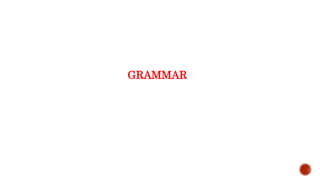
Grammar
- 1. GRAMMAR
- 2. Present Simple We use Present Simple To talk about facts or things which are generally true. To talk about regular action To give instructions or directions The simple present is not used to express actions happening now Present Simple – Form Positive:Add 's' or 'es' after the verb with he/she/it -- For exp: She understands English. Negative: Use the auxiliary do/does+not+verb.--For exp: He does not want vanilla. Questions:Use do and does,but don't change the form of the main verb. -- For exp: Does it have a subsidiary in Canada? -With question words(who,what,where etc) use do and does after the question word. For exp:Why do we use question words? To give a short answer to questions in the present simple use the subject +does/do or doesn't/don't ? For exp:Does your company operate in Canada?--- Yes,it does/ No,it doesn't. Exeptions:The verb be is irregular I am;You/She/They are; He/She/It is In questions with be,do not use do and does. For exp: Is he very tired? In negative sentences with be add not or n't. For exp: I'm not from Germany.
- 3. Present Continuous We use Present Continuous: To describe actions in progress at the moment of speaking. To describe actions in progress around the present time,but not always at the moment of speaking. To describe current trends. Present Continuous – Form Positive:Use am/is/are + ing form. For exp:She is crying. Negative:Use am/is/are + not + ing form. For exp:He is not standing. Questions: To make questions with present continuous,put am/is/are before the subject.- For exp:Are you still working for the same company? To give a short answer to yes/no questions in the present continuous,use the:subject+am/is/are: For exp:Are you still working for the same company? Yes,I am/No,I'm not.
- 4. Past Simple We use to talk about past repeated actions. To talk about long term situations in the past which are no longer true We use the Past Simple to describe a finished action in the past. Words and phrases we often use with the past simple are: Yesterday,last week,last year etc. Past Simple - Form Positive:Add 'ed' to the infinitive of regular verbs and 'd' to the infinitive of regular verbs ending in 'e‘. For exp: ->Emma sailed to America in 1989. ->He lived in North America. Change the 'y' and add 'ed' to regular verbs ending ing consonant + "y". For exp: She played the piano when she was child. Double the final consonant of short regular verbs ending in vowel+consonant. For exp: We skipped the Channel yesterday. Negative:Put didn't before the infinitive of both regular and irregular verbs. For exp: They didn't see the boss. Questions:Put did before the subject and the infinitive of both regular and irregular verbs. For exp: What did you play yesterday evening? To give a short answer to yes/no questions in the past simple,use the subject +did/didn't. For exp: Did John give you my passport?
- 5. Present Perfect We use Present Perfect to talk about past actions where the time includes the present. To describe progress in a list of things to do, we use already and (not)...yet? To ask someone about general experiences in his/her life, we use ever. Use the present perfect to talk about actions which started in the past and are continuing now. For past actions where the time doesn't include the present, use the past simple. Present Perfect – Form Positive :have/has+ past participle form. For exp: I have visited Gratz. Negative: have/has +not+ past participle. For exp:I have not cleaned my room yet. Questions:Put have/has before the subject. For exp:Have you seen Lucy? And to give a short answer to yes/no questions in the present perfect, use the subject + has /have or hasn't/ haven't. For exp:Have you done your homework? --- Yes,I have/No,I haven't Present Perfect with “for” and “since” 1.To talk about an action that started in the past and is continuing now. For exp:I have played for Manchester United for five years. 2.We use for with a period of time. For exp:I have worked here for five years. 3.We use since with a precise date or point in time For exp:She has lived here since 2000.
- 6. The passive We use when the person who does the action is unknown. When the person who does the action is unimportant . When the person who does the action is too obvious to mention. When we want to say who does something in a passive sentence,we use the preposition by. Passive – Form Verbs in sentences can either be active or passive. The passive is formed with the verb+ past participle of the main verb. Present simple(passive form) and Past simple: For exp:The letters are delivered. --- The letters were delivered. Questions 1.To make questions in the passive, put is/are/was/were + subject+ past participle. For exp:Is the child treated well in his new home? 2.To give a short answer to questions in the passive, use the subject + is/are/was/were. For exp: Was Olivia killed by Emma? Yes,he was/No he wasn't
- 7. THANK YOU